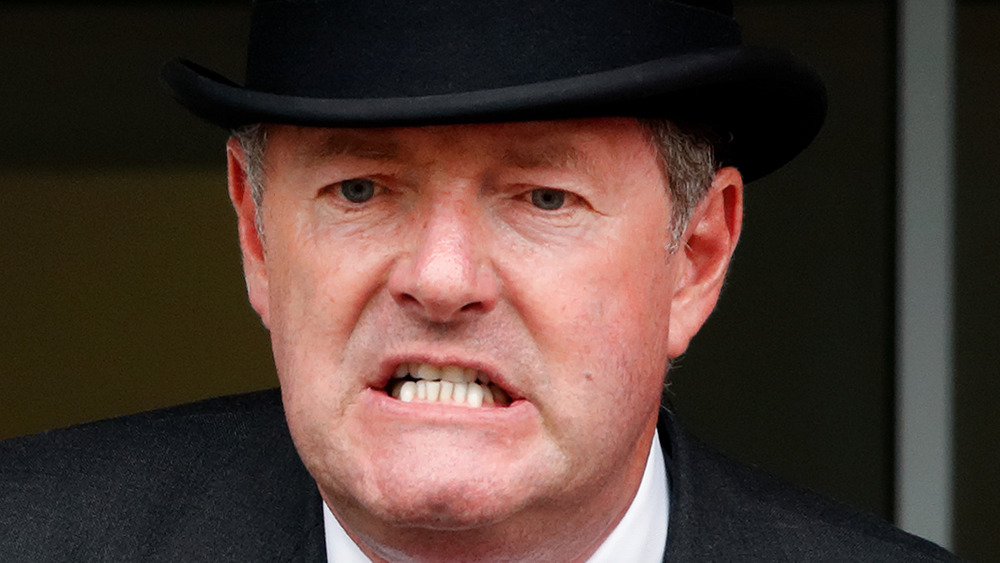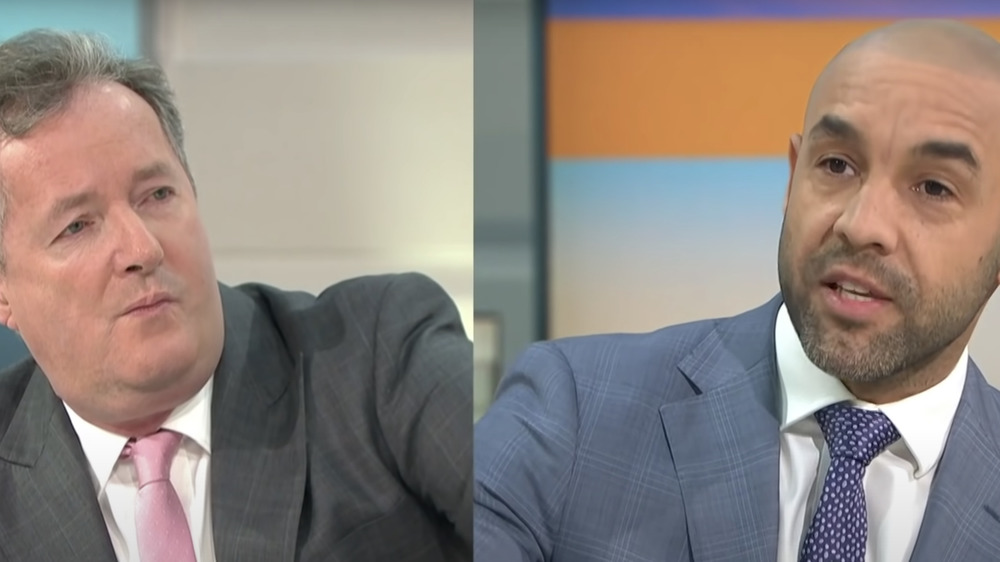Body Language Expert Makes Bold Claims About Piers Morgan And Alex Beresford's Blowout
Piers Morgan claims to have had "one goal" when he joined Good Morning Britain's team, "beat @BBCBreakfast in the ratings" (via Twitter). Morgan and his cohost Alex Beresford's blowout over Meghan and Harry's Oprah interview made his dreams come true. 1.29 million people watched him stomp off set on March 9, 2021, just about .4 million more than the 1.25 million that watched BBC Breakfast's somewhat tamer morning programming (via BBC).
In the aftermath of Morgan's explosive resignation from Good Morning Britain, Morgan has found himself to be the subject of national and international scrutiny. Even Vanity Fair's done research into his "one-side feud with Meghan Markle." On Twitter, Morgan's on-air attacks against Markle have enraged the likes of Jameela Jamil and Yvette Nicole Brown. Google Trends, meanwhile, shows that worldwide interest in the British broadcaster's name has skyrocketed over this last week.
The List spoke exclusively to body language expert and psychologist Dr. Reneé Carr to gain insights into what pushed Piers Morgan over the edge during his now-infamous Good Morning Britain outburst. Carr wasn't surprised by the outburst at all. On the contrary, she told The List that Morgan reacted as "a beta male ... easily offended when others do not easily submit or defer to him."
A body language expert's take on Piers Morgan's reaction to racism at Buckingham Palace
If you watched Piers Morgan and Alex Beresford's Good Morning Britain showdown, maybe you noticed it too. There's the time when Beresford talks about his personal experiences with racism: a colleague asked him whether or not he was worried about what color of skin his son would be born with. As Beresford narrates, Morgan interjects, with an affirmation, "right." That's significant, says Carr. "By speaking this automatic agreement with the question, Piers is unconsciously communicating that he believes the question was a natural question and would not, himself, believe it to be offensive if he asked a person that question," she explained.
It wasn't only the one interjection. Carr told The List that Morgan was much more uncomfortable discussing issues of race than he should have been. "Piers' unprompted anger at the verbalization of 'racist' and 'racism' communicates that he may have hidden biases and stereotyped thinking that could be construed as racist, but that he is extremely offended by the possible association of him with extreme racist groups and behaviors," Carr analyzed.
Still more significant? When Beresford questioned how Morgan would react if one of his children married a Black woman, Morgan's repeatedly insisted "I would love that!" That, says Carr, should ring alarm bells. "His elevated pitch and repeating of his words can be interpreted as a revelation of, 'Thou doth protest too much,'" Carr said.
This is what Piers Morgan really feels about Meghan Markle
While Piers Morgan was uncomfortable discussing issues of race, he was only visibly angered when things got personal: When Alex Beresford brought up Morgan's relationship with Markle. If you watch the interview leading up to Morgan's outburst, pay attention to the way that Morgan turned his body away from Beresford and avoided eye contact with him as the two discuss Markle. "This is a psychological cue that Piers is uncomfortable with rejection, in general, or with women, in particular," Carr signaled. The fact that Morgan used his encounter with Markle to generalize that The Duchess of Sussex "cuts people out of her life," is also noteworthy. Carr reads it as a "tell-tale sign of Piers having indeed felt a sense of rejection by Meghan and that he is personally offended and hurt."
Carr thinks that it was this personal hurt, brought sharply into the public eye, that was the straw the broke the camel's back. Morgan "appears to be a man who is used to being dominant," Carr told The List. Alex Beresford's insistence that Meghan had "cut [him] off" proved too much for the 55-year-old broadcaster to bear. It was, Carr says, "an affront to his manhood, ego, and self-esteem."


